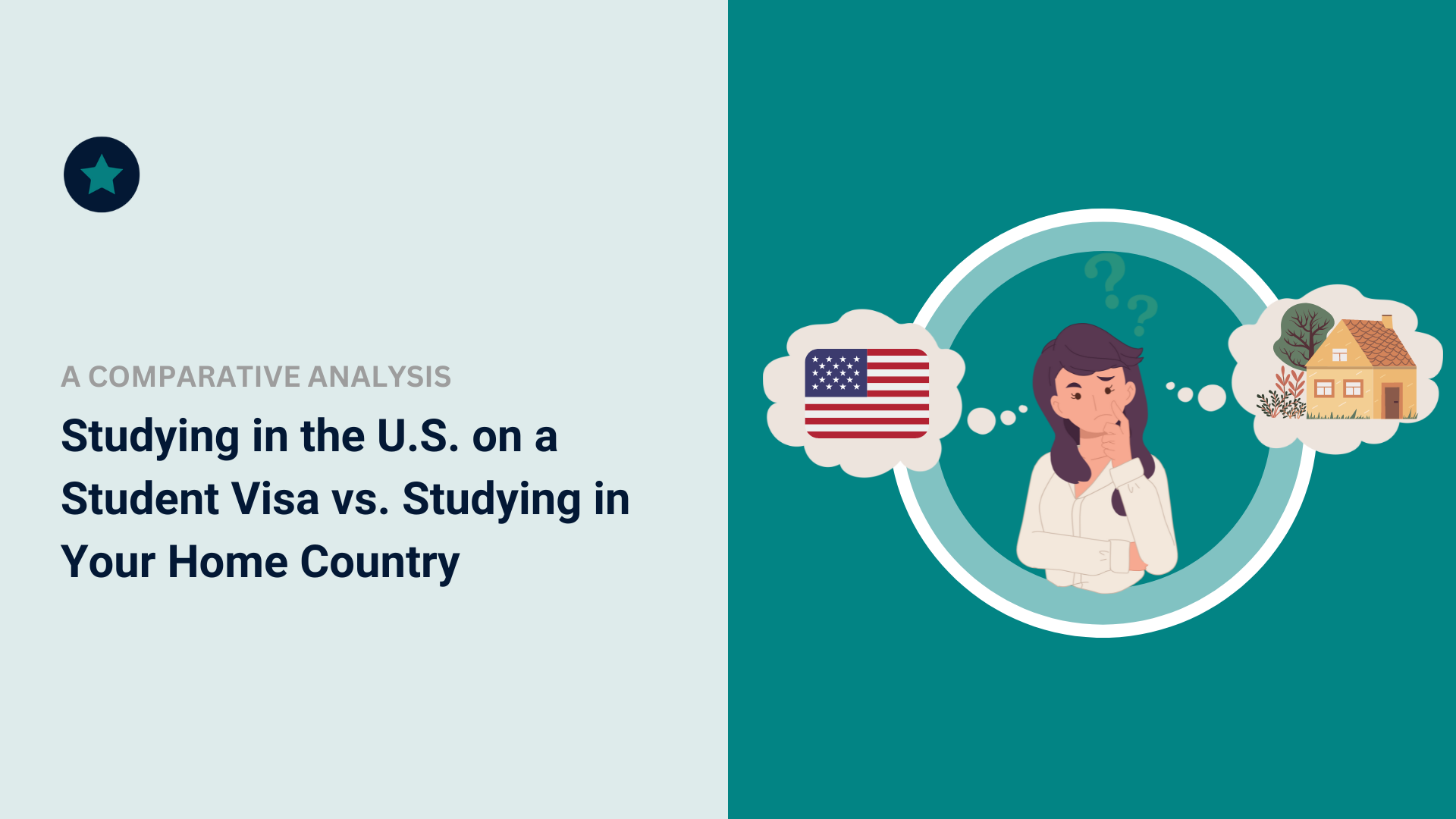Studying abroad is an exciting and life-changing experience for many students. However, deciding where to study and whether to pursue an education in one’s home country or abroad can be a challenging decision.
For many international students, pursuing a U.S. education on a student visa can be an attractive option, given the high-quality education, exposure to new cultures, and potential for better career prospects. However, studying in one’s home country can also offer many advantages, such as lower costs, familiarity with the language and culture, and closer proximity to family and friends.
This blog post aims to offer a side-by-side comparison of pursuing a U.S. education on a student visa versus studying in one’s home country to help readers make an informed decision. We will talk about the pros and cons of each choice, such as cost, academic quality, cultural experiences, and career opportunities.
Ultimately, the decision to study in the USA on a student visa or in one’s home country will depend on individual circumstances and priorities. This post will provide useful information to help readers make the best decision for their personal situation.
Cost Comparison
One of the most significant factors to consider when deciding whether to pursue a U.S. education on a student visa or to study in one’s home country is cost. The cost of education and living expenses can vary significantly between countries and institutions.
Let’s take a closer look at the cost comparison between the two options:
Cost of Studying in the U.S. on a Student Visa
Studying in the United States on a student visa can be costly. According to the College Board, the average annual tuition fee for a public four-year college in the USA for the academic year 2022-23 was $10,950 for in-state students and $28,240 for out-of-state students.
For private four-year colleges, the average annual tuition fee was $39,400. In addition to tuition fees, international students must also consider the cost of living expenses, such as accommodation, transportation, food, and healthcare.
According to the International Student Calculator, the estimated cost of living in the USA for an academic year for an international student was $15,500 to $19,000.
Cost of Studying in One’s Home Country
Studying in one’s home country can be less expensive than studying in the USA. In many countries, the cost of tuition fees for universities is lower than that of private universities in the USA.
Additionally, students can save on living expenses since they can live with their families and avoid expensive international travel. Moreover, there may be government-sponsored scholarships and financial aid available for students studying in their home country.
Other Factors to Consider
While studying in the USA on a student visa can be costly, it’s important to consider the return on investment. A U.S. education offers better career prospects and higher earning potential in the long run, which offsets the higher costs.
Additionally, there are scholarship and financial aid opportunities available to international students studying in the USA that can help reduce the financial burden.
It’s important to note that the cost of education and living expenses can vary significantly depending on the institution and location within the United States or one’s home country. Students should research and compare costs carefully and consider all potential expenses, such as travel and visa fees, when making their decision.
Overall, the cost comparison between studying in the U.S. on a student visa versus studying in one’s home country can be complex and depend on individual circumstances. Students should carefully weigh the costs and potential benefits before making a decision.
Need to speak to a former U.S. consular officer?
Academic Quality Comparison
Another important factor to consider when deciding whether to pursue a U.S. education on a student visa or to study in one’s home country is academic quality. The academic quality of an institution can have a significant impact on the value of the degree obtained and the career prospects after graduation.
Let’s take a closer look at the academic quality comparison between the two options:
Academic Quality in the U.S.
The United States of America is home to some of the world’s most prestigious universities, such as Harvard, Stanford, and MIT. The U.S. also has a diverse range of institutions, from large public universities to small private colleges, that offer a variety of programs and majors.
The USA’s higher education system is known for its research-oriented approach and innovative teaching methods. Studying in the USA can provide access to cutting-edge research, world-class faculty, and state-of-the-art facilities.
Additionally, studying in the United States can provide opportunities for internships, networking, and hands-on experience that can enhance the learning experience and career prospects.
Academic Quality in One’s Home Country
The academic quality of institutions in one’s home country can vary significantly depending on the country and the institution. However, many countries have well-respected universities that offer high-quality education.
Studying in one’s home country can provide familiarity with the language and culture, as well as connections with local businesses and industries. Additionally, studying in one’s home country may provide opportunities for internships and networking, although these opportunities may be more limited than in the U.S.
Other Factors to Consider
When comparing the academic quality of studying in the United States on a student visa versus studying in one’s home country, it’s important to consider factors such as program availability, faculty quality, research opportunities, and teaching methods. Additionally, it’s essential to research the specific institution and program of interest to evaluate the academic quality.
To summarize, the academic quality comparison between studying in the U.S. on a student visa versus studying in one’s home country can depend on individual circumstances, such as the desired program of study and career goals. Students should carefully research and compare the academic quality of institutions before making a decision.
Cultural Comparison
Apart from cost and academic quality, another significant factor to consider when deciding whether to pursue a U.S. education on a student visa or to study in one’s home country is cultural differences. Studying abroad can be a transformative experience that exposes students to new cultures, languages, and perspectives.
Let’s take a closer look at the cultural comparison between the two options:
Cultural Experience in the USA
Studying in the United States on a student visa can provide an immersive cultural experience. The U.S. is a diverse country with a rich cultural heritage, and studying in the U.S. can provide opportunities to interact with people from different backgrounds and learn about different cultures.
Additionally, studying in the USA can provide opportunities to improve language skills, learn about American customs and traditions, and engage in extracurricular activities such as sports, clubs, and events.
Cultural Experience in One’s Home Country
Studying in one’s home country can also provide a unique cultural experience. While it may not offer the same level of immersion as studying in the U.S., studying in one’s home country can provide opportunities to learn about local customs and traditions, as well as interact with people from different regions and backgrounds within the country.
Additionally, studying in one’s home country can provide a sense of familiarity and comfort that may be lacking when studying abroad.
Other Factors to Consider
When comparing the cultural experience of studying in the United States on a student visa versus studying in one’s home country, it’s essential to consider factors such as language barriers, cultural shock, and homesickness. Studying in a foreign country can be challenging, and students should be prepared to adapt to new environments and cultural norms.
Generally, the cultural comparison between studying in the U.S. on a student visa versus studying in one’s home country can depend on individual circumstances, such as personal preferences and cultural background. Students should carefully consider the cultural aspects of both options before making a decision.
Career Prospects Comparison
One of the primary reasons for pursuing higher education is to improve career prospects and earning potential. When deciding whether to pursue a U.S. education on a student visa or to study in one’s home country, it’s important to consider the career prospects comparison between the two options.
Let’s take a closer look:
Career Prospects in the U.S.
The United States is home to some of the world’s largest and most innovative companies, offering a wealth of career opportunities for graduates. Studying in the U.S. can provide access to industry connections, internships, and job fairs that can enhance career prospects.
Additionally, many U.S. institutions have strong career centers that offer career counseling, resume workshops, and job search assistance.
Career Prospects in One’s Home Country
Career prospects in one’s home country can vary significantly depending on the country and industry. However, many countries have growing and thriving industries that offer job opportunities for graduates.
Studying in one’s home country can provide connections to local businesses and industries, as well as an understanding of the local job market. Additionally, studying in one’s home country may provide language and cultural skills that can be attractive to international companies and employers.
Other Factors to Consider
When comparing the career prospects of studying in the U.S. on a student visa versus studying in one’s home country, it’s important to consider factors such as the desired industry, job market trends, and work visa requirements. Additionally, it’s essential to research the specific institution and program of interest to evaluate the career prospects.
Overall, the career prospects comparison between studying in the United States on a student visa versus studying in one’s home country can depend on individual circumstances, such as career goals and desired industry. Students should carefully research and compare the career prospects of both options before making a decision.
Conclusion
Deciding whether to pursue a U.S. education on a student visa or to study in one’s home country can be a challenging decision that requires careful consideration of various factors. In this blog post, we have examined the pros and cons of pursuing a U.S. education on a student visa versus studying in one’s home country. We have discussed the cost, academic quality, cultural experience, and career prospects comparison between the two options.
Ultimately, the decision depends on individual circumstances such as personal preferences, financial considerations, career goals, and desired cultural experience.
While studying in the United States on a student visa can provide access to a world-class education, diverse cultural experiences, and career opportunities, it can also be expensive and challenging. Studying in one’s home country can be more affordable and comfortable, but it may not provide the same level of cultural immersion and career opportunities as studying in the U.S.
It’s important for students to carefully research and compare the pros and cons of both options before making a decision. Students can consult with academic advisors, career counselors, and international education professionals to gather information and make an informed decision.
In conclusion, pursuing higher education is a significant investment of time, money, and effort, and it’s essential to choose an option that aligns with one’s goals and aspirations. Whether pursuing a U.S. education on a student visa or studying in one’s home country, students can make the most of their education by staying focused, dedicated, and motivated to achieve their academic and career goals.
(This blog post was written by our Content Strategist, Kausar Shaikh)
DISCLAIMER:
This blog does not endorse or advocate for any illegal activities. All content presented here is intended for educational purposes only. The viewpoints expressed do not constitute legal advice and are solely based on the writer’s opinions and experiences. Please use the information provided responsibly. Any advice given is of a general nature and should be applied to your specific circumstances with caution and consideration.
Copyright © 2024 UDETI LLC. All rights reserved.





